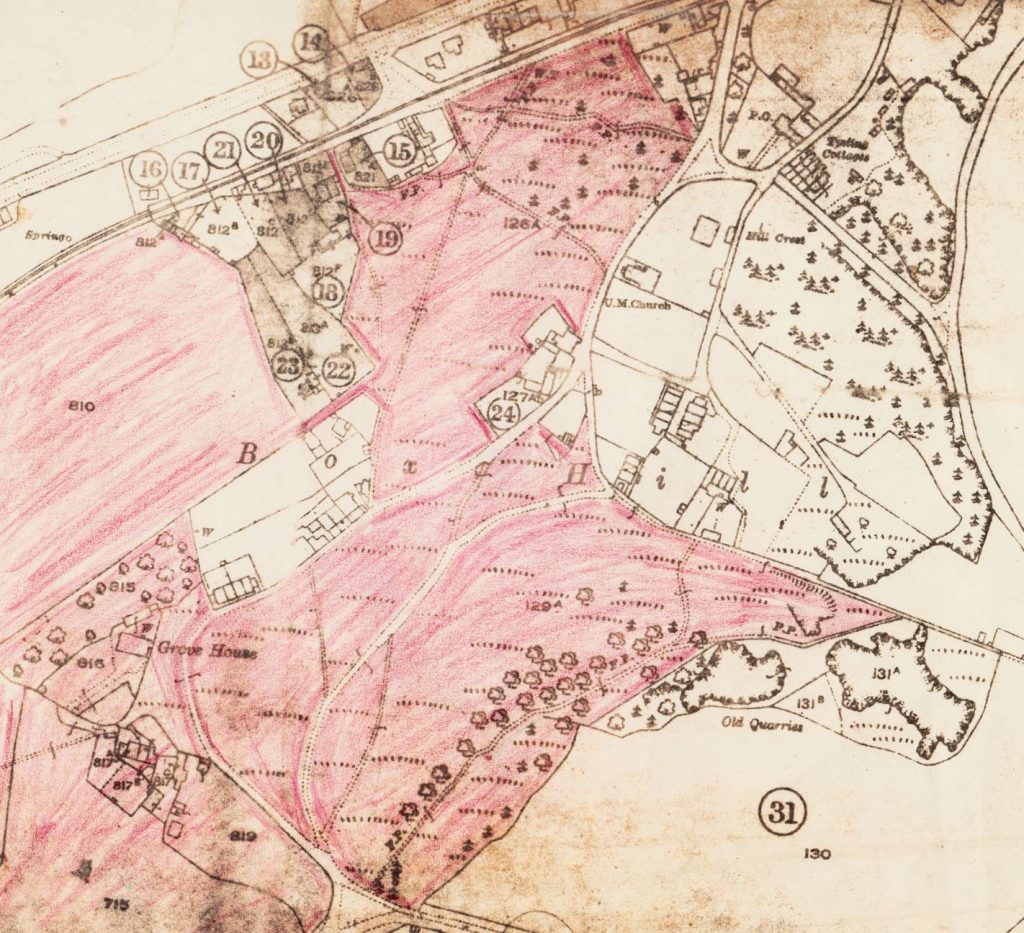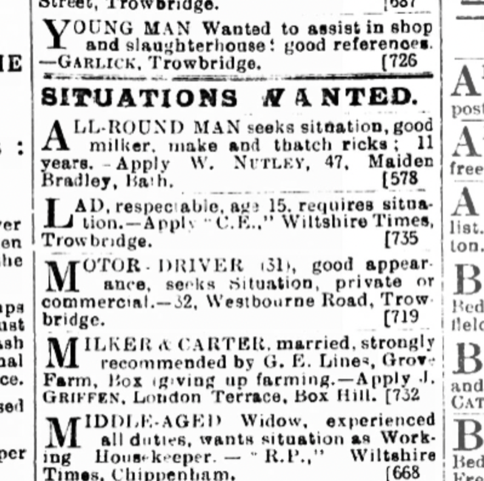My Grandparents moved into Grove Farm, at Box in Wiltshire some time after the First World War. As they married on 19th August 1922, and Grandpa was discharged from the army on 8th April 1919, it is quite likely that he moved to the farm before 1922. It turns out that my Grandfather moved in first, as show by the 1921 Census.
Grove Farm

Grove Farm is a Grade II Listed Building, (or more accurately two terraced houses on the farm are).
Grove Farm, Box Hill, is quite an isolated area which grew up very quickly with stone quarrying after Box Tunnel was built in 1841. The farm was owned by the Northey family, lords of the manor 1726 – 1919, then put up for auction on 24 May 1923, possibly selling (with sitting tenant) to Fred Neate, who owned a considerable amount of land in the area.
It’s called Grove House on the auction Sale Particulars map above where the area farmed by GE Lines is shown pink, comprising 43 acres, 3 roods, 14 perches, described as Valuable Dairy Farm. The farm house was on 3 floors with gas and water supplied which appear to have been installed by the tenant (possibly my Grandfather). The dairy appears to have been a 6-tie cow-stall.
It is on the fringe of Box Hill Common, which was bought by the council for public access after a huge argument in 1970s about developing it.
Thanks to Alan of http://www.boxpeopleandplaces.co.uk/ for the above information.
Farming at Grove Farm
The 1921 Census shows that on 16th June George Edward Lines, Occupation Farmer, was living at Grove farm, along with Emma Ody, his Widowed Housekeeper, aged 48, and 4 months, and born in Devonshire.
He was farming there by 1922, as according to page 74 of “From G&J to Tri-ang” – written by Peggy Lines and privately published – the origin of the name Pedigree came via a visit to the farm:
Then, in 1922, the problem was solved in a somewhat unlikely manner when Will and Walter visited their brother George at his farm in Gloucestershire where he was trying to raise a heard of pedigree pigs. There and then, amidst all the mud and muck which those animals create, the brothers agreed that Pedigree was just the name they had been looking for to describe their beautiful new prams!
From G&J to Triang, Page 74
I suspect this should be Wiltshire, rather than Gloucestershire.
While at the farm he sold eggs and chickens
Mr Lines selling Pure, Fertile Eggs at 4s per dozen at the farm plus a variety of cockerels, ducks and specialist hens.
The Bath Chronicle, 27 January 1923
Mr Lines selling Light Sussex, White Leghorn, Barneveld, Pekin (sic) Drake, White Runners… Inspection Invited
The Bath Chronicle, 15 March 1924
Thanks to Alan, from http://www.boxpeopleandplaces.co.uk/ for these references.
My Grandmother used to deliver eggs, riding a motorbike with sidecar. This may have been the same motorbike and sidecar which was later used by my uncle Michael and aunt Fanny on their many visits to the Coastguard Cottage at Birling Gap.
Leaving the farm
According to “From G&J to Triang” – page 106
George joined his father in 1923
However I suspect it was later than this as my Uncle Michael, born 16th March 1924, had his birth registered in the Chippenham registration district, whereas my father, Roger, born 12th May 1926, was born in Southgate. The farm, along with the whole village of Box, struggled in the Great Depression after the war, as chronicled in http://www.boxpeopleandplaces.co.uk/after-the-war.html and this surely was a major factor in my Grandfather giving up the farming he loved to go and help his father in the G&J Lines toy business. It is also probable that the death of his mother, Jane, on 7th June 1925 influenced the decision.
There was a notice in the Wiltshire Times and Trowbridge Advertiser dated 25th October 1924 which announced the Sale by Auction of the livestock, agricultural machinery and house contents of Grove Farm, to take place on Tuesday November 4th 1924.

Also on the 18th October 1924 in the Wiltshire Times and Trowbridge Advertiser Situations Wanted section a J. Griffin of London Terrace, Box Hill advertised his availability as a Milker and Carter. He says he is married, presumably as an indication of him being likely to be a responsible employee, and that he is strongly recommended by G.E. Lines, Grove Farm, Box (giving up farming).

My Grandfather was on the Electoral Roll at 225, Fox Lane, Wood Green, Haringey in 1925, so they had presumably moved by then.
Connections around Box
Box Tunnel
It is possible that one of the things which attracted my Grandfather, as an Engineer by training, to the area was Brunel‘s famous Box Tunnel, which allows the Great Western Railway to pass through the hill on its way from London to Bristol.
Coincidentally Pendon Museum, which is has a large model of the Vale of the White Horse, where I used to live and work, incorporates the Box Tunnel into its scene (there being no suitable tunnel in the Vale to suit the layout).
Pickwick
When he moved away from Grove Farm my Grandfather called the house he rented in Cheam “Pickwick”, and then the house he had built in Kingswood was also named “Pickwick”.
Pickwick is a now part of Corsham, but was probably still a separate hamlet when my Grandfather lived in the area. A baby boy was found in this area around 1748, and was named Moses Pickwick. His grandson, Eleneazer Pickwick, became a successful businessman, running a coaching business, and it believed that Charles Dickens named his main character in The Pickwick Papers, after the name he saw on coaches on the Bristol to Bath route. My uncle and father then named their family newspaper “The Pickwick Paper“, after the novel by Dickens.
We now live in Grove Farm House and would be happy to show you round the farm…when it’s possible!
Thank you, I believe some of the alterations to the Farm made by my grandfather might still exist, but I am not sure exactly what they were.